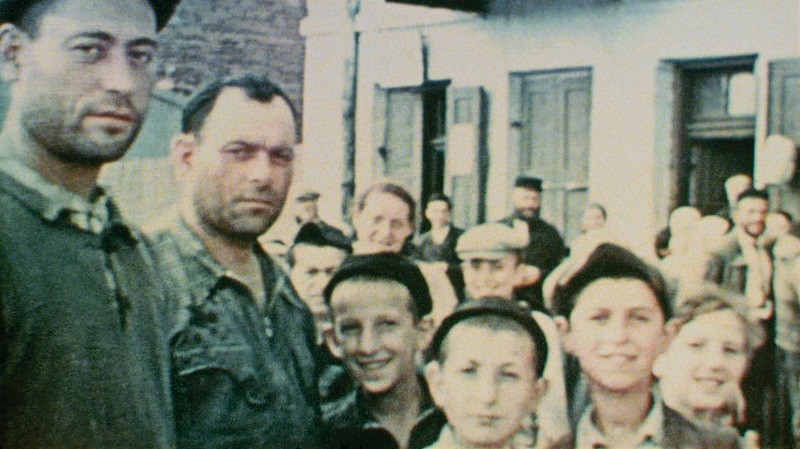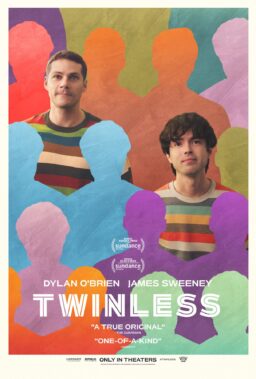Despite a few of my favorite documentaries of 2021 premiering at Sundance last year, including “Flee,” “Summer of Soul,” and “In the Same Breath,” I ended up surprisingly light on non-fiction films this year (in part because we divided by program and Mr. Nick Allen got the U.S. Documentary Competition section). I did get to see a few that snuck out into Premieres and other sections and liked them all to various degrees. Here are some brief thoughts on three of them, all so different in tone and style.
The most structurally daring feature at this year’s Sundance played in the Spotlight section, one that highlights a few works that have played at other festivals like “The Worst Person in the World” and “After Yang.” The doc in that section is Bianca Stigter’s haunting “Three Minutes – A Lengthening,” a study of not just history but how we unpack and interpret footage of it. In 2009, a man named Glenn Kurtz found a 16mm home movie in his parents’ closet, footage from a vacation that his grandfather took to Poland in 1938. Stigter’s film opens with this uncut footage. We see dozens of people in a Jewish community gathering in a square, many staring straight at the camera while others go about their days or come together for some sort of event. There’s only one blurry sign and few landmarks, so it’s hard to tell exactly who these people are and what they’re doing, but that didn’t stop Kurtz.
He turned into a celluloid detective, first figuring out where the footage was shot—Nasielsk, Poland—and then trying to find anyone who could fill in the history of this place and its people, quickly learning that almost all of them were killed during the Holocaust. Fewer than 100 people from Nasielsk survived World War II. Most of these people would be dead much sooner than they could have known. It’s like watching ghosts.
And it’s all we see. Stigter’s film consists of no footage other than what’s in those three minutes. Frames will be pulled out and dissected, such as when Kurtz tries hard to read a grocery store sign to figure out its owner, likely the woman emerging from the front door. Narrated by Helena Bonham Carter, “Three Minutes – A Lengthening” becomes more than just history but a conversation about how we capture it. It’s mentioned that the footage was so degraded that restoration likely would have been impossible if it hadn’t been found when it was. What then? These people would have never been seen again, forever lost to history. Stigter’s film makes the case that when we record even something as casual as a family vacation, we are capturing life in a way that’s important. Celluloid matters not just as a passive viewing experience but as a portal through time and place. It’s a powerful, essential piece of filmmaking.

It’s hard to fathom a documentary as distinctly different from Stigter’s as Amy Poehler’s “Lucy and Desi,” a relatively routine bio-doc but with an intimate, personal touch from a female comedian who clearly admires its subjects. While the structure can be repetitive and overly familiar, the respect that Poehler and her collaborators have for Lucille Ball and Desi Arnaz is contagious, leading to a Prime Video film that’s ultimately more satisfying than the Oscar darling by Aaron Sorkin currently airing on the streaming giant.
To be fair, “Lucy and Desi” takes in a much broader view of its subjects’ lives than “Being the Ricardos.” Whereas that film focused mostly on one tumultuous week, Poehler’s film tries to assess the entire life and influence of two entertainment giants. Ball and Arnaz met in 1940 at the RKO Pictures commissary, and television would never be the same. Books have been written on the influence of “I Love Lucy,” but some of the most interesting chapters of “Lucy and Desi” dig deeper into the impact of Desilu Productions, which was the biggest TV studio of its time. These two shaped pop culture.
And Poehler’s smartest move was to hear from some of the trendsetters who wouldn’t really without Lucy and Desi, especially Carol Burnett and Bette Midler, two people who eloquently comprehend what Ball meant to their careers. Poehler was also given remarkable access to home movies and sound bites, allowing Ball to tell much of her own story. And then, of course, there’s the personal touch of a powerful TV comedian like Poehler (who was also married to an entertainer for 13 years in Will Arnett) and what that brings to a project like this one. It can make it feel a bit like hagiography, but there’s no denying that what comes through in this story about Lucy is the love.

Finally, there’s Rory Kennedy’s “Downfall: The Case Against Boeing,” a documentary so unsettling that it could play in the Midnights section. We’ve all seen documentaries that pull back the curtain on how companies value profit over human life, but rarely has it been on an infuriating scale like this, which is such a damning portrait of the corporate culture at Boeing that allowed tragedy to occur that one could see it forever altering the future of that company. An organization that built its reputation on its straight safety protocols quite simply allowed them to drift away as a competitor (Airbus) grew prominence in the industry. Kennedy details the result of this inevitable disaster in the 2018 crashes of two Boeing 737 MAX jets less than five months apart, revealing how cut corners led to the loss of over 300 lives.
Kennedy makes the questionable decision to recreate the crashes with animated sequences of blinking cockpit dashboards and sounding alarms. It’s not necessary. The horror and gravity of what happened on Lion Air Flight 610 and Ethiopian Airlines Flight 302 is right there in the eyes and quavering words of the family members who lost people on them. Her film is most effective when we’re with those victims as they try to fight back against a company that’s constantly pushing the blame onto someone else.
To say that Boeing comes off badly here would be an understatement. Kennedy’s film feels a little familiar in terms of form—it plays like a special one might see on CNN on a Sunday night—but it is unblinking in its condemnation of a company that took stock prices more seriously than the safety of its passengers. It might make people with travel plans think twice when it premieres on Netflix later this year.












